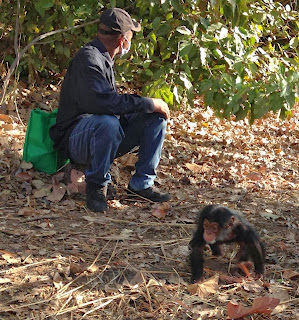It's been awhile since I've shared news of the Fongoli chimps, so here is an update! The group is doing well and even though there were no births in 2013, we are expecting at least one in 2014 if not more (Come on Tumbo! Eva?!). David remains the alpha male, and he may have mellowed a little. He is still close with the second ranked male, his brother Mamadou. A number of the younger males have risen up the hierarchy. Jumkin, for example, was mid-ranking in August and had moved near the top of the 12-male hierarchy by December. Mike has been up and down the hierarchy. He comes in pretty assertively and then is relegated to the fringes of the social group after several males join forces to put him in his place.
It's been over a year since our team rescued infant Toto after the death of his mother, Tia, who sustained a poisonous snake bite. Toto has been under the care of Janis Carter of the Baboon Island Chimpanzee Sanctuary in The Gambia (see image above of Toto and one of his full-time caregivers, Ousmane). He goes out for trips "en brousse" (in other words, out in the wild) with our team, and he is four times the size of chimps of the same age in the wild. He will have to continue his milk diet (at least partial) until he is two years of age, which is the minimum a chimp could survive in the wild after being orphaned. Chimp infants at Fongoli are normally nursed by their mothers for around four years, although they begin eating other foods much earlier. We have a number of options lined up for Toto as far as his future goes.
Toto was 2 months old when his mother Tia died, and his older sister Aimee was about four (photo above of infant Aimee with her mother Tia - photo by Kelly Boyer). Aimee had been taken by poachers when she was only 9 months old, and although she survived for another four years following this traumatic event, I'm sad to say she disappeared last year. She stayed with the group for approximately 6 months after the death of her mother, and she had been weaned at least 2 months before that, when Toto was born. However, I believe the chimp-napping incident with the poachers did effect her ability to survive without the companionship and support of her mother for very long. Additionally, mother chimps still share some foods with their older offspring, and although Aimee did receive foods like hard-to-process baobab fruit from other group members, it appears she was not able to survive the trauma she experienced early and then later in her young life. Still, Aimee was with her group for another 4 years following her capture by poachers, and young apes rarely live for more than 3 years after such an experience. You can watch video of Aimee's miraculous return to her group by following the link to the National Geographic documentary here. Aimee's story is featured in the first several minutes of this documentary, and you can see some video of her acceptance back by the Fongoli chimps.
The Fongoli group is also adjusting to increased gold mining activity within their home range but in part because of the respect chimpanzees are shown by the people living alongside them, these apes are currently able to deal with such disruption. They will be featured in several documentaries this year, including ones produced by the BBC, National Geographic and Arte TV (France/Germany).
Research on West African chimpanzees living in a savanna mosaic at Fongoli, Senegal since 2001, with a focus on the behavioral ecology of apes in a semi-arid environment. Associated with the Neighbor Ape 501c3 non-profit organization (US), which seeks to conserve the chimpanzees at Fongoli and to provide for the wellbeing of people that live alongside them. Project Director, Dr. Jill D. Pruetz, Professor of Anthropology, Texas State University, San Marcos, Texas, USA
Wednesday, March 5, 2014
Subscribe to:
Post Comments (Atom)




No comments:
Post a Comment